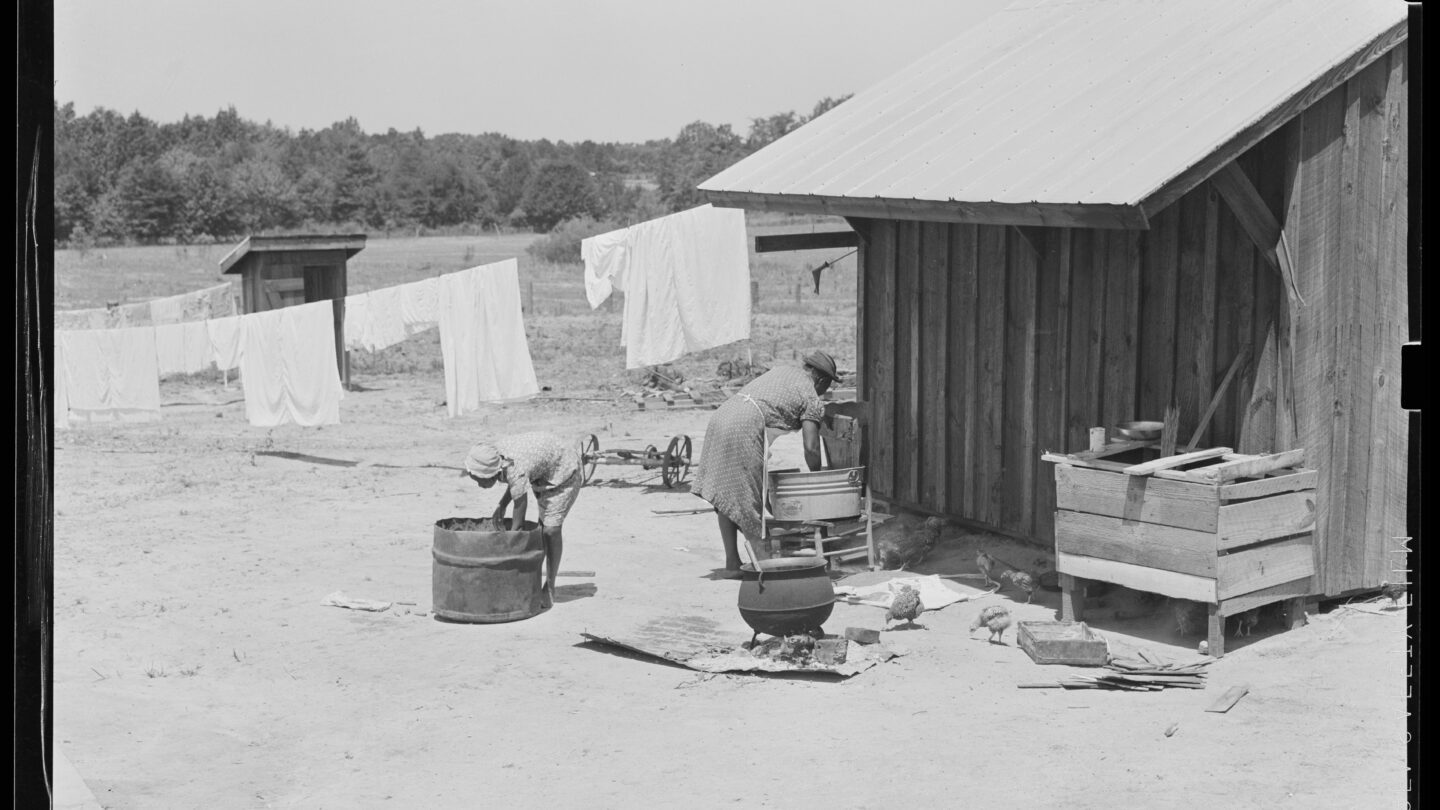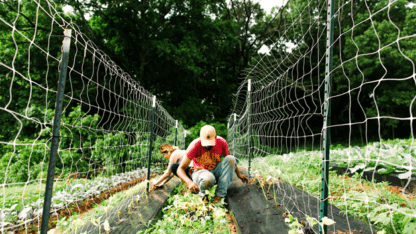Georgia rushes to preserve historic Black farming community

When Cleveland Whitehead, 74, drives his black Chevy Silverado through the backroads of Macon County in middle Georgia, he remembers the families who worked the land on Flint River Farms back in the day. He looks out over the cotton fields, pecan orchards and dirt tracts that dot the area.
“When I was coming up, I plowed with two mules,” he said. “We had a garden and an okra field close to the house. My dad grew cucumbers, corn, cotton, some sugar cane and peanuts.” The family’s 178-acre farm also had a small fruit orchard with just enough peaches and pears to feed the family once in a while.
As the youngest of 13, Whitehead admitted that he didn’t do a lot of the farm work. While he did occasionally help with the crops, a small creek near the Whitehead farm offered alluring opportunities for catfish noodling — that Southern tradition of capturing catfish with bare hands.
And he vividly remembers the day when he and his brother took a mule-drawn wagon into the fields to take his father some lunch.
“When we arrived, he had his head in his hands,” Whitehead recalled. “Full of despair, he was trying to figure out how to make ends meet. He said, ‘There’s no seed, no rain — it’s scary times.’”
Whitehead’s family was one of the original families to participate in the Flint River Farms Resettlement Project. Established in 1937 by the U.S. Department of Agriculture as a New Deal project, it gave African Americans the opportunity to purchase farmland and develop their farm-management skills at a time when most Black farmers were sharecroppers. It was a noble attempt at creating some racial equity that had mixed results. And it was an important part of Black history that Whitehead and his cofounders of the Flint River Farms Preservation Society are eager to keep alive.
CREATING OPPORTUNITY
The New Deal resettlement project involved more than 1.8 million acres across the United States — much of it former plantation land purchased by the federal government. Thirteen communities designated for African American farmers were established in the South, including Flint River Farms.
The community was initially intended to be located in Fort Valley, but resistance by white families led to its relocation 22 miles away near Montezuma. It encompassed 10,879 acres divided into 107 farms of about 90 acres each. Each farm unit had a house, a barn, two mules, an outhouse, a chicken coop and a smokehouse.
The heart of Flint River Farms was the school and community center that contained six classrooms, a kitchen, dining room, auditorium, vocational shop and health center. In addition to local students, the school was used as a training center for African American teachers from Fort Valley State College.
“The Flint River Farms Resettlement Project provided hope and the opportunity to pursue a dream of land ownership for its participants,” wrote Tasha M. Hargrove, an associate professor at Tuskegee University, in an email exchange. She was part of a research team that conducted a grant-funded study of the community in 2003. “The benefits derived from the project were not limited to land ownership. This project can be described as a successful demonstration of community action and building for a group of people who had previously been limited to the lowest rung of society’s social and economic ladder.
“The project was not perfect,” she continued, “however, it achieved the goal of providing an opportunity for landless sharecroppers and tenants to own farmland. Many of the project participants were able to purchase the land, and some of the families still have the land today.”
The project received national attention and was recognized as one of the more successful resettlement communities. In modern terms, the project was a lease-to-purchase arrangement. After five years, families could buy the land with a 40-year mortgage at 3% interest. Many of the original families did acquire deeds for their farms. But by the mid-1940s, a developer bought 26 of the farmhouses and relocated them. In 1965 the school closed, and by the mid-1970s, only 19 founding families still held land. In 2003, when Tuskegee scholars conducted their study, just 3,186 acres remained in the hands of 16 founding families or their descendants.
According to Hargrove and her fellow Tuskegee scholar Robert Zabawa writing for the New Georgia Encyclopedia, Flint River Farms fell victim to the events that surrounded it. In addition to the objections of conservative Southern politicians, World War II took a toll as many of the participating farmers joined the armed forces or took jobs at nearby Robins airfield (now Robins Air Force Base).
PRESERVING THE PAST
Whitehead’s childhood home no longer stands, but there’s a marker there, identifying the former home site.
“The house wasn’t really that big,” Whitehead said. “It was about 40-by-24 feet.” He pointed out the foundation of the smokehouse, which was situated near the house, with the barn and the chicken coop close by.
After college and a stint in the Marines with active duty in Vietnam, Whitehead settled down in Atlanta where he had a career with the Atlanta Police Department as a commander and the state of Georgia as a probation officer. But he often returns to Macon County, where he still owns some of the family land. He is passionate about preserving the Flint River Farms Project history.
So is Curtis McDonald, 66, a cofounder of the Flint River Farms Preservation Society. Although his family was not one of the farm families, McDonald attended the school. He can still picture it: the library, vocational shop, basketball court, softball field, the classrooms and the health building where doctors would visit to provide healthcare.
“Before this school was built, children were going to school in churches,” he said. “Blacks didn’t have schools. So, when this school came, it was like a college campus. It was the most beautiful thing they had seen. I believe there were around 300 students there, most of them girls.
“Those girls back then were tough,” he said with a shake of his head and a grin. “They worked as hard as we did and played as hard as we did. And, they would fight as hard as we did.”
In 2004, McDonald and Whitehead, along with Bob Melvin and Ricky Waters, founded the Flint River Farms Preservation Society.
The following year, they obtained a long-term lease from the local school board of 25 acres of the original school site. They cleared about 11 acres and created the Flint River Farms Community School Heritage Park where community events and fundraisers are held, like upcoming Heritage Day on Feb. 5. Festivities begin at 9 a.m. and include a pig roast and farming demonstrations. Other upcoming events include a community cleanup day, Easter egg hunt and a car show. And whenever possible, the events provide an opportunity to teach younger generations what life was like at Flint River Farms.
At a Christmas celebration last year, paper bags stood upright on a picnic table, the contents hidden from eagerly awaiting children. When each child was given a bag, inside was discovered an apple, an orange and a single piece of peppermint candy.
“That’s what I used to get for Christmas,” McDonald said. “I want kids to know that it wasn’t easy. Don’t forget where you came from.”
Three years ago, the Flint River Farms Preservation Society moved an original Flint River Farms house to the site. A work in progress, it sits on cinder blocks, and over the front door extends a metal roof supported by temporary 2-by-4s. The goal is to restore the house to its original glory and get it listed on the National Register of Historic Places.
McDonald relaxes in the doorway of the house with his arms folded and takes in the views of the historic property and community park. He projects a seriousness that only slightly masks an easygoing manner as he gazes across the road at an unharvested cotton field that belonged to one of the original Flint River Farms. Combines and trucks of all sizes interrupt his view as they pass by on County Road 289.
He dreams of a day when the history of the Flint River Farms Project is taught in schools. He doesn’t want people to forget this place and what the community meant to people.
“The foundation for the Flint River Farms project is its people and their passion for preserving their heritage,” Hargrove stated. “The project participants stepped out on faith to pursue a dream of land ownership and were able to achieve their dreams. The descendants of the original participants … have worked diligently to preserve the history of this community. This group is an excellent example of community engagement and empowerment at work.”
For McDonald and Whitehead, it’s all about remembering the past and preserving history.
“President Roosevelt thought enough of this to get it going and develop it, and I think enough of it to keep it going,” McDonald said. “People should know that this place exists, and this is what we’re trying to achieve. Our heart is in this thing.”







